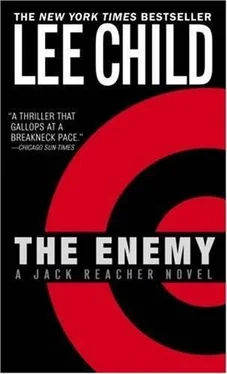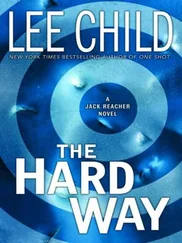“Are you sure?”
“Completely. Vassell is from Mississippi and Coomer is from Illinois. Neither of them has ever lived or served anywhere near Sperryville.”
I was quiet for a second.
“Are they married?” I said.
“Married?” Franz said. “Yes, there were wives and kids in there. But they were local girls. No in-laws in Sperryville.”
“OK,” I said.
“So what are you going to do?”
“I’m coming to California.”
I putthe phone down and walked along the corridor to Summer’s door. I knocked and waited. She opened up. She was back from sightseeing.
“She died last night,” I said.
“I know,” Summer said. “Your brother just called me from the apartment. He wanted me to make sure you were OK.”
“I’m OK,” I said.
“I’m very sorry.”
I shrugged. “Conceptually these things don’t come as a surprise.”
“When was it?”
“Midnight. She just gave up.”
“I feel bad. You should have gone to see her yesterday. You shouldn’t have spent the day with me. We shouldn’t have done all that ridiculous shopping.”
“I saw her last week. We had fun. Better that last week was the last time.”
“I would have wanted whatever extra time I could have gotten.”
“It was always going to be an arbitrary date,” I said. “I could have gone yesterday, in the afternoon, maybe. Now I’d be wishing I had stayed for the evening. If I had stayed for the evening, I’d be wishing I had stayed until midnight.”
“You were in here with me at midnight. I feel bad about that too.”
“Don’t,” I said. “I don’t feel bad about it. My mother wouldn’t either. She was French, after all. If she’d known those were my options, she’d have insisted.”
“You’re just saying that.”
“Well, I guess she wasn’t very broad-minded. But she always wanted whatever made us happy.”
“Did she give up because she was left alone?”
I shook my head. “She wanted to be left alone so she could give up.”
Summer said nothing.
“We’re leaving,” I said. “We’ll get a night flight back.”
“California?”
“East Coast first,” I said. “There are things I need to check.”
“What things?” she said.
I didn’t tell her. She would have laughed, and right then I couldn’t have handled laughter.
Summer packedher bag and came back to my room with me. I sat on the bed and played with the string on Monsieur Lamonnier’s box.
“What’s that?” she said.
“Something some old guy brought around. He said it’s something that should be found with my mother’s stuff.”
“What’s in it?”
“I don’t know.”
“So open it.”
I shoved it across the counterpane. “You open it.”
I watched her small neat fingers work on the tight old knot. Her clear nail polish flashed in the light. She got the string off and lifted the lid. It was a shallow box made out of the kind of thick sturdy cardboard you don’t see much anymore. Inside were three things. There was a smaller box, like a jewel case. It was made of cardboard faced with dark blue watermarked paper. There was a book. And there was a cheese cutter. It was a simple length of wire with a handle on each end. The handles were turned from dark old wood. You could see a similar thing in any épicerie in France. Except this one had been restrung. The wire was too thick for cheese. It looked like piano wire. It was curled and corroded, like it had been stored for a very long time.
“What is it?” Summer said.
“Looks like a garrote,” I said.
“The book is in French,” she said. “I can’t read it.”
She passed it to me. It was a printed book with a thin paper dust jacket. Not a novel. Some kind of a nonfiction memoir. The corners of the pages were foxed and stained with age. The whole thing smelled musty. The title was something to do with railroads. I opened it up and took a look. After the title page was a map of the French railroad system in the 1930s. The opening chapter seemed to be about how all the lines in the north squeezed down through Paris and then fanned out again to points south. You couldn’t travel anywhere without transiting the capital. It made sense to me. France was a relatively small country with a very big city in it. Most nations did it the same way. The capital city was always the center of the spiderweb.
I flipped to the end of the book. There was a photograph of the author on the back flap of the dust jacket. The photograph was of a forty-years-younger Monsieur Lamonnier. I recognized him with no difficulty. The blurb underneath the picture said he had lost both legs in the battles of May 1940. I recalled the stiff way he had sat on my mother’s sofa. And his walking sticks. He must have been using prosthetics. Wooden legs. What I had assumed were bony knees must have been complicated mechanical joints. The blurb went on to say he had built Le Chemin de Fer Humain . The Human Railroad. He had been awarded the Resistance Medal by President Charles de Gaulle, and the George Cross by the British, and the Distinguished Service Medal by the Americans.
“What is it?” Summer said.
“Seems like I just met an old Resistance hero,” I said.
“What’s it got to do with your mom?”
“Maybe she and this Lamonnier guy were sweethearts way back.”
“And he wants to tell you and Joe about it? About what a great guy he was? At a time like this? That’s a little self-centered, isn’t it?”
I read on a little more. Like most French books it used a weird construction called the past historic tense, which was reserved for written stuff only. It made it hard for a nonnative to read. And the first part of the story was not very gripping. It made the point very laboriously that trains incoming from the north disgorged their passengers at the Gare du Nord terminal, and if those passengers wanted to carry on south they had to cross Paris on foot or by car or subway or taxi to another terminal like the Gare d’Austerlitz or the Gare du Lyon before joining a southbound train.
“It’s about something called the Human Railroad,” I said. “Except there aren’t many humans in it so far.”
I passed the book to Summer and she flipped through it again.
“It’s signed,” she said.
She showed me the first blank page. There was an old faded inscription on it. Blue ink, neat penmanship. Someone had written: À Béatrice de Pierre . To Beatrice from Pierre.
“Was your mother called Beatrice?” Summer asked.
“No,” I said. “Her name was Josephine. Josephine Moutier, and then Josephine Reacher.”
She passed the book back to me.
“I think I’ve heard of the Human Railroad,” she said. “It was a World War Two thing. It was about rescuing bomber crews that were shot down over Belgium and Holland. Local Resistance cells scooped them up and passed them along a chain all the way down to the Spanish border. Then they could get back home and get back in action. It was important because trained crews were valuable. Plus it saved people from years in a POW camp.”
“That would explain Lamonnier’s medals,” I said. “One from each Allied government.”
I put the book down on the bed and thought about packing. I figured I would throw the Samaritaine jeans and sweatshirt and jacket away. I didn’t need them. Didn’t want them. Then I looked at the book again and saw that some of the pages had different edges than some of the others. I picked it up and opened it and found some halftone photographs. Most of them were posed studio portraits, reproduced head-and-shoulders six to a page. The others were clandestine action shots. They showed Allied airmen hiding in cellars lit by candles placed on barrels, and small groups of furtive men dressed in borrowed peasant clothing on country tracks, and Pyrenean guides amid snowy mountainous terrain. One of the action shots showed two men with a young girl between them. The girl was not much more than a child. She was holding both men’s hands, smiling gaily, leading them down a street in a city. Paris, almost certainly. The caption underneath the picture said: Béatrice de service à ses travaux . Beatrice on duty, doing her work. Beatrice looked to be about thirteen years old.
Читать дальше












